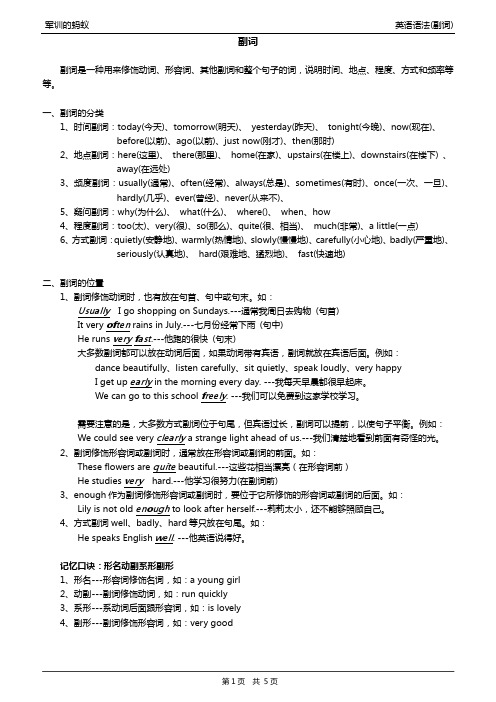小学英语单词:副词的用法
- 格式:docx
- 大小:19.97 KB
- 文档页数:6

副词副词是一种用来修饰动词、形容词、其他副词和整个句子的词,说明时间、地点、程度、方式和频率等等。
一、副词的分类1、时间副词:today(今天)、tomorrow(明天)、yesterday(昨天)、tonight(今晚)、now(现在)、before(以前)、ago(以前)、just now(刚才)、then(那时)2、地点副词:here(这里)、there(那里)、home(在家)、upstairs(在楼上)、downstairs(在楼下) 、away(在远处)3、频度副词:usually(通常)、often(经常)、always(总是)、sometimes(有时)、once(一次、一旦)、hardly(几乎)、ever(曾经)、never(从来不)、5、疑问副词:why(为什么)、what(什么)、where()、when、how4、程度副词:too(太)、very(很)、so(那么)、quite(很、相当)、much(非常)、a little(一点)6、方式副词:quietly(安静地)、warmly(热情地)、slowly(慢慢地)、carefully(小心地)、badly(严重地)、seriously(认真地)、hard(艰难地、猛烈地)、fast(快速地)二、副词的位置1、副词修饰动词时,也有放在句首、句中或句末。
如:Usually I go shopping on Sundays.---通常我周日去购物(句首)It very often rains in July.---七月份经常下雨(句中)He runs very fast.---他跑的很快(句末)大多数副词都可以放在动词后面,如果动词带有宾语,副词就放在宾语后面。
例如:dance beautifully、listen carefully、sit quietly、speak loudly、very happyI get up early in the morning every day. ---我每天早晨都很早起床。

小学英语语法一、形容词与副词的定义形容词:我们把用来修饰名词、代词的词称为形容词。
形容词主要描述人或者事物的性质、特征和状态。
1.形容词一般在句中作定语,放在名词或代词前面,都含有“……的”意思。
如:a nice watch 一只漂亮的手表 a blue car 一辆蓝色的小汽车2.形容词作表语(有些形容词只能作表语,放在系动词之后)These flowers are blue. 这些花是蓝色的。
副词:说明事情发生的时间、地点、原因、方式、等含义的词,我们称之为副词。
多用来修饰动词或整个句子。
They live happily. (happily快乐地,幸福地,修饰动词live)Exe. The turtle is _________. The turtle runs ___________. (slow)二、形容词、副词的比较级和最高级的构成规则大多数形容词、副词都有等级的变化,表示“比……更……”或“最……”。
形容词用来表示物的等级差别一般有原级、比较级和最高级三种形式。
如:1.一般情况下,直接在原词后加-er,或加-est如:quick------quicker-------quickest slow------slower------slowest2.以不发音的e结尾的单音节词,比较级在原词后加-r,最高级在原词后加-st如:nice------nicer------nicest large------larger------largestwhite------whiter------whitest safe------safer------safest3.以辅音字母加y结尾的双音节词,变y为i, 再加-er或-est.如:heavy------heavier------heaviest easy------easier------easiestearly------earlier------ealiest happy------happier------happiest4.重读闭音节结尾的形容词或副词,要双写末尾的辅音字母,再加-er或-est如:fat------fatter------fattest red------redder------reddestthin------thinner------thinnest wet------wetter------wettestbig------bigger------biggest hot------hotter------hottest5.部分双音节或多音节词要在原词前面加more或most.如:beautiful------more beautiful------most beautifuluseful------more useful------most usefuldelicious------more delicious------most deliciousdifferent------more different------most differentdifficult------more difficult------most difficultcarefully------more carefully------most carefully不规则变化:good/well------better------best bad------worse------worstmany/much------more------most little------less------leastfar------farther------farthest (指距离的远近)far------further------furthest (表示程度上更进步)old------older------oldest (表示年纪大)old------elder------eldest (表示长幼关系)三、形容词、副词比较级的用法表示两者间的比较用比较级。

小学英语语法:副词的分类以下是整理的“小学英语语法:副词的分类”内容,供大家参考学习,希望大家可以仔细阅读,若想了解更多“小学英语语法”的相关内容,可以关注,小编会持续为大家更新。
什么是副词?副词是一种修饰动词、形容词或全句的词,说明时间、地点、程度、方式等概念。
1.时间副词now, today, yesterday, tomorrow, before, soon, early等,其出现往往决定了该语句表达的时态。
Now I'm writing a letter.现在我正在写信。
I went to the park yesterday.我昨天去公园了。
I will be back soon.我很快就回来了。
2.频率副词部分频率副词频率高低的排序:always (—直)♥♥♥♥♥♥♥♥♥♥usually (通常)♥♥♥♥♥♥♥often (经常)♥♥♥♥♥♥sometimes (有时)♥♥♥♥♥seldom (很少)♥♥♥♥hardly (几乎不)♥♥♥never (从不)还有说明次数的副词,once, twice等。
频率副词经常出现在一般现在时态的语句中,表示规律性的动作或习惯。
Ben often goes to the cinema with his friend.本经常和他的朋友岀去看电影。
He never eats hamburgers.他从不吃汉堡包。
3.地点副词here, everywhere, anywhere, in, out, inside, outside, above, below, down,back, forward, home, along, round, around, near, off, past, up, away 等地点副词一般表示事情发生的地点。
He played basketball here yesterday他昨天在这里打篮球。
It's raining outside.外面正在下雨。


小学频度副词知识点总结1. 常见的频度副词英语中有一些常见的频度副词,它们帮助我们描述动作发生的频率。
这些频度副词包括:always(总是)、usually(通常)、often(经常)、sometimes(有时候)、rarely(很少)、seldom(很少)、never(从不)等等。
这些副词可以帮助我们更准确地表达动作发生的频率。
2. 适用的语法结构频度副词通常放在动词之前,但是在“be”动词之后。
例如:- He always goes to school by bus.- I usually play football with my friends on weekends.- She often helps her mother with the housework.- I sometimes visit my grandparents in the countryside.当句子用一般现在时时,频度副词通常是用来描述习惯或经常发生的动作。
然而,当句子使用现在进行时时,频度副词则用来描述暂时的情况或动作,例如:- He is always talking in class.(他总是在课堂上讲话。
)- She is usually studying at this time.(她通常在这个时候在学习。
)- They are often playing games in the park.(他们经常在公园里玩游戏。
)3. 错误用法在使用频度副词时,一些学生可能会犯一些常见的错误。
例如,一些学生可能会误用频度副词,把它们放在不正确的位置上。
另外,有些学生可能会用错频度副词,把它们与动词不正确地搭配在一起。
因此,需要特别注意在使用频度副词时,要确保它们的正确位置和正确使用方式。
4. 如何提高使用频度副词的能力为了提高学生的使用频度副词的能力,教师可以通过一些练习来帮助他们掌握这方面的知识。
例如,可以设计一些练习题,让学生在练习中熟练掌握频度副词的用法。

小学英语形容词和副词用法大全一. 形容词:1. 形容词作定语通常前置,但在下列情况后置:1)修饰some, any, every, no和body, thing, one等构成的复合不定代词时,如nobody absent, everything possible;2)以-able, -ible结尾的形容词可置于有最高级或only修饰的名词之后,如the best book available, the only solution possible;3)alive, alike, awake, aware, asleep等可以后置,如the only person awake;4)和空间、时间、单位连用时,如a bridge 50 meters long;5)成对的形容词可以后置,如a huge room simple and beautiful;6)形容词短语一般后置,如a man difficult to get on with3.复合形容词的构成:1)形容词+名词+ed kind-hearted 2)形容词+形容词dark-blue 3)形容词+现在分词ordinary-looking4)副词+现在分词hard-working5)副词+过去分词newly-built6)名词+形容词world-famous7)名词+现在分词peace-loving8)名词+过去分词snow-covered9)数词+名词+ed three-egged10)数词+名词twenty-year二. 副词副词的分类:1 时间副词soon, now, early, finally, once, recently2 地点副词here, nearby, outside, upwards, above3 方式副词hard, well, fast, slowly, excitedly, really4 程度副词almost, nearly, very, fairly, quite, rather5 频度副词always, often, frequently, seldom, never6 疑问副词how, where, when, why7 连接副词how, when, where, why, whether, however, meanwhile8 关系副词when, where, why三. 形容词和副词比较等级:形容词和副词的比较等级分为原级,比较级和最高级。
小学英语中频度副词的用法频度副词:频度副词包括确定性频度副词和非确定性频度副词一(确定性频度副词:once,twice,three times a day weekly,daily,fortnightly,monthly,yearly,annually1(确定性频度副词通常放在句尾I saw my girlfriend once a weekhe visited his cousins fortnightly. 他每两周拜访他的兄妹们一次。
They celebrate their wedding anniversary annually. 他们每年庆祝一番结婚纪念日。
2(但在复合句中,由于句中不只存在一个动词,因此应根据频度副词所修饰的对象确定其相应位置,以免产生歧义Once a monthly,we visit our daughter who’s at HarvardUniversity.我们每个月去看望在哈佛大学上学的女儿(once a month 用在句首,因此根据其就近原则,应理解为它所修饰的对象是visit,而不是is)We visit our daughter who’s at Harvard University once a month.我们去看望每个月去一次哈佛大学的女儿(once a month 用在句尾,这时应该理解为它所修饰的对象是is,而不是visit)二 (非确定性频度副词:always, generally, usually, often,sometimes, seldom, never, ever1(在肯定句和疑问句中的非确定性频度副词通常放位于be动词之后,谓语动词之前或复合谓语之间。
I usually get up at 6: 00 in the morning.我通常早上六点起床。
He always goes to school by bike.他总是骑车去上学We hardly ever see Mr Lee these daysI was never very good at maths。
小学英语单词:副词的用法小学英语单词:副词的用法副词(Adverb)是指在句子中表示行为或状态特征的词,用以修饰动词、形容词、其他副词或全句,表示时间、地点、程度、方式等概念。
副词可分为:时间副词、频率副词、地点副词、方式副词、程度副词、疑问副词、连接副词、关系副词、表顺序的副词。
下面是店铺收集的关于副词的知识点,有兴趣的朋友们可以看看。
1. 副词的用法:(1)修饰动词: He works hard. He speaks slowly.(2)修饰形容词: The flower is very beautiful.(3)修饰其他副词: He works very hard.(4)修饰名词: Even a child (or Even he)can do it.(5)修饰全句: Probably he will come back.(6)修饰副词片语:He came exactly at two o‘clock.(7)修饰副词子句: He started soon after we came.2. 副词的位置(1)副词修饰形容词、副词(片语或子句)时,通常放在前面。
The mountain is very beautiful.He came long before the appointed time.(2)修饰动词的副词不及物动词 + 副词 She speaks well.及物动词 + 受词 + 副词 She speaks English well.(3)表确定时间或场所的副词,通常放在句首或句末,放在句首时语气较强。
She was born in Taipei in 1948.(4)always, never, often, sometimes, usually等频率副词的位置。
(A)在一般动词前: They always say so.(B)有动词be时,在be动词后: I am always busy.(C)有助动词时,在助动词和本动词间: This job will never be finished.(5)置于句首修饰全句:Fortunately he succeeded in the examination.(6)同类两个以上的`副词须依 (单位较小者 + 单位较大者)的顺序排列。
He lives at Taichung, in Taiwan, Republic of China.(7)有两个以上不同种类的副词修饰语时,其顺序为:地点+状态+次数+时间。
She arrived there safely the other day.3. 时间副词(1)Time“时候”:可以用作when的答语,如: late ( = at a late time), now ( = at this time), presently (= at the present time), then ( = at that time), just, nowadays, today, etc.I’ve just heard that you are leaving us. ( = at this very moment)Nowadays,many teenagers have long hair. ( = at the present time)注:两个以上表时间的副词须依“单位小的时间+单位大的时间”排列。
I‘ll see you at nine on Monday.(2)Duration“期间” :用来作how long的答语,如:momentarily, temporarily, for many weeks, long, from May till August, etc.Has he been ill long? Yes, he has been ill since the end of May.He was away from school (for)four or five weeks.(3)Frequency“频率”:用来作how often的答语,可分两种:(A)非限定频率:always,usually,often,sometimes,seldom, ever, etc.The sun always rises in the east. My brother rarely writes to me.(B)限定频率:daily, hourly, monthly, annually, twice,everyday, once, etc.I have been in Singapore once.We have English lessons every other day.注:以上三种时间副词在一起时,其顺序为“期间+频率+时间”。
I was there for a day or so every year during my childhood.注:Seldom,rarely,never等有否定意义的频率副词置于句首,要将助动词或be动词放在主词之前。
Seldom do we hear such fine singing from school choirs.4.地方副词:表示where?的副词,也包括“动态方向”的副词,如:below, by, down, elsewhere, far, here, home, in,locally, near, off, opposite, out, around, away, back,outward(s), right, sideway(s), upward(s), etc.(1)地方副词通常置于句尾,加强语气时可放在句首。
He lives in a small village. They are not there.(2)两个地放副词并列时,地方确定的副词在后面,地方不确定的副词在前面。
The children running around upstairs.(3)两个以上的地方副词须依“小地方+大地方”的顺序排列。
Many people eat in restaurants in London.5. 几个特殊副词的用法:(1)enough, too,(A)enough放在所修饰的形容词和副词后面; too放在形容词和副词前面。
She’s old enough t o do some work.She‘s too old to do any work.(B)too…to + 动词“太…而不能”, enough to + 动词“足够可以”(= so…that)I am too poor to afford such extravagance.= I am so poor that I cannot afford such extravagance.You are rich enough to keep a maid.= You are so rich that you can keep a maid.(2)very, much,(A)very修饰形容词,副词; much (或very much)修饰动词。
He spoke very carefully.It is much talked about these days.(B)Very修饰原级形容词及副词;much修饰比较级,最高级的形容词及副词。
our work is very good.This is much better.This is much (by far)the best.(3)already, yet, still,(A)Already用于肯定句,作“已经”解; yet用于否定句,作“还”解,用于疑问句作“已经”解。
I already like him. (= I have by this time come to like him.)He can’t drive yet. (= He can‘t drive up to this time.)注:Already用在疑问句或否定句时,表惊讶。
Have you already seen him? (= That was quick.)(B)Still表动作或状态的持续,作“仍然”解。
I still like him. (= I continue to like him.)注:Still放在动词前后,有时句意不同。
He is still standing. (continue to stand)He is standing still. (= standing motionless)(4)only和 also常随句中位置的变动,句意和语气也会改变。
Only John phoned Mary today.John phoned only Mary today.John phoned Mary only today (today only)。
(5)just, merely, purely, simply等字放在所修饰的词语之前; alone则放在其后。
You can get a B grade just (merely, purely, simply)for that answer.You can get a B grade for that answer alone.6.副词应注意的事项:(1)有些字可当形容词又可当副词,例如: early; past; half; long; straight; fast; hard; quick; deep; slow; pretty; awful; wrong; right; high; late; hourly; early; weekly; etc.We had an early breakfast. (形容词)We went by a fast train. (形容词)We had breakfast early. (副词)Don’t spea k so fast. (副词)(2)above; then; after; up; down; away; home等地方或时间副词亦可作形容词。
The above statement (= the statement which is above)(3)有些形容词变为副词,可在字尾加ly,也可以不加,不过在字义上不同。
(A)easy“安适地”; easily“容易地”;Stand easy!He‘s not easily satisfied.(B)clear ( = com pletely“完全地”; clearly“显然地”)The bullet went clear through the door.The thieves got clearly away.(C)high“高”; highly“很; 非常”The birds are flying high.He was highly praised for his work.(D)Slow和slowly当副词时同义,但slow比slowly语气强。